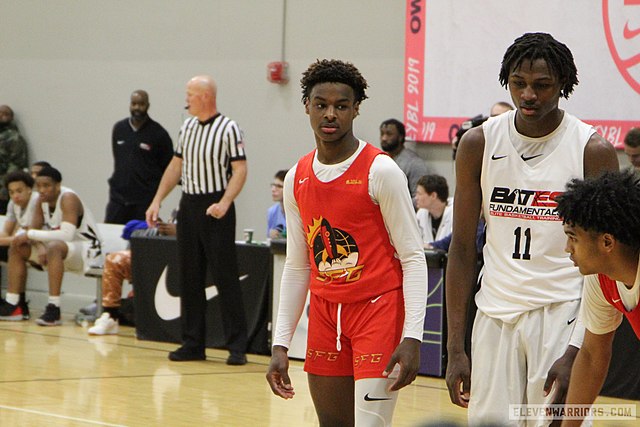For aspiring basketball players across the nation, years of dedication, disciplined training and the mastery of their craft culminate in the career-defining two-round event —the NBA draft.
As the lights go out and the hopefuls wait for their names to be called, many are overlooked. It’s not for a lack of talent, but because others have a famous last name.
Nepotism isn’t new in sports, but Bronny James’s selection by the Los Angeles Lakers, marked a turning point in how the NBA views—and sells—family legacies.
“I think nepotism is fair because they don’t choose that life,” junior and former basketball player Angelina Volpe said. “It’s positive if they have talent, but negative if they’re just getting that opportunity because they have famous parents.”
Players like Domantas Sabonis, Klay Thompson, Devin Booker and Seth and Steph Curry have earned praise for matching or even exceeding their fathers’ legacies.
But when Bronny joined his father Lebron James on the Lakers, critics called it a new low in NBA nepotism.
Selected as the 55th out of 58 draft picks, Bronny hardly made the cut. In his first four months in the NBA, he averaged four minutes per game and acquired a grand total of 14 points, both of which are considerably low for the league. More importantly, his four-year contract for $7.9 million with the Lakers highlights that Bronny will be alternating between playing for the Lakers’ G-League affiliate, the South Bay Lakers and the NBA.
Critics, including former NBA player Steven Hunter, pointed out the unusual contract terms.
“Typically late second round picks don’t get four year guaranteed roster spot deals either,” Hunter wrote on his private Instagram account. “This wasn’t earned, I’m sorry… And it’s an egregious abuse of power from LBJ (LeBron James) and Rich Paul. It’s a slap in the face to all of the kids out there who work their asses off to get to the league.”
Despite limited minutes and questionable skill, Bronny remains on the roster– fueling ongoing criticism of favoritism.
“Seeing undeserving nepo-babies, like Bronny James, definitely does bother me,” Volpe added.
Critics and sports analysts expressed concerns regarding this draft selection. American sports radio host and journalist Stephen A. Smith contributed to this conversation, urging LeBron to reconsider Bronny’s involvement in the team.
“I am pleading with LeBron James as a father: stop this,” Smith stated on a First Take episode. “We all know that Bronny James is in the NBA because of his dad. We love what we’re seeing from him in the G League because that’s where you belong as you honed your skills and you get better and you legitimately earn, which I believe he has the potential to do. I am rooting for Bronny James, it would be cruel to root against him. He’s a wonderful kid, I wish him nothing but the best. But he’s LeBron James’ son and everybody knows what attention that brings.”
Lebron’s public desire to play alongside his son only intensifies the speculation.
“To be able to play in this league and also being able to do it alongside Bronny right now, that’s one of the biggest accomplishments and probably the No. 1 accomplishment I’ve ever been able to do,” Lebron explained on the New Heights with Jason and Travis Kelce podcast.
The Lakers’ decision appears driven as much by marketing potential as by basketball merit.
This became increasingly apparent during the Lakers’ 2024-25 season opener, which gained extensive media coverage and became historic as the duo became the first father and son to play together in an NBA game.
The financial impact of Bronny’s presence has become undeniable. Ticket demand surged and prices skyrocketed as well, in both the South Bay Lakers and NBA Lakers teams. His No. 9 jersey became the best-selling rookie jersey of the season, cementing interest in the player.
The Bronny-Lebron saga serves as a stark reminder that nepotism influences not just player selection, but the very fabric of the game. As the league prioritizes legacy and marketability over effort and talent, it raises important questions about fairness, opportunity and what truly defines success in professional sports.




